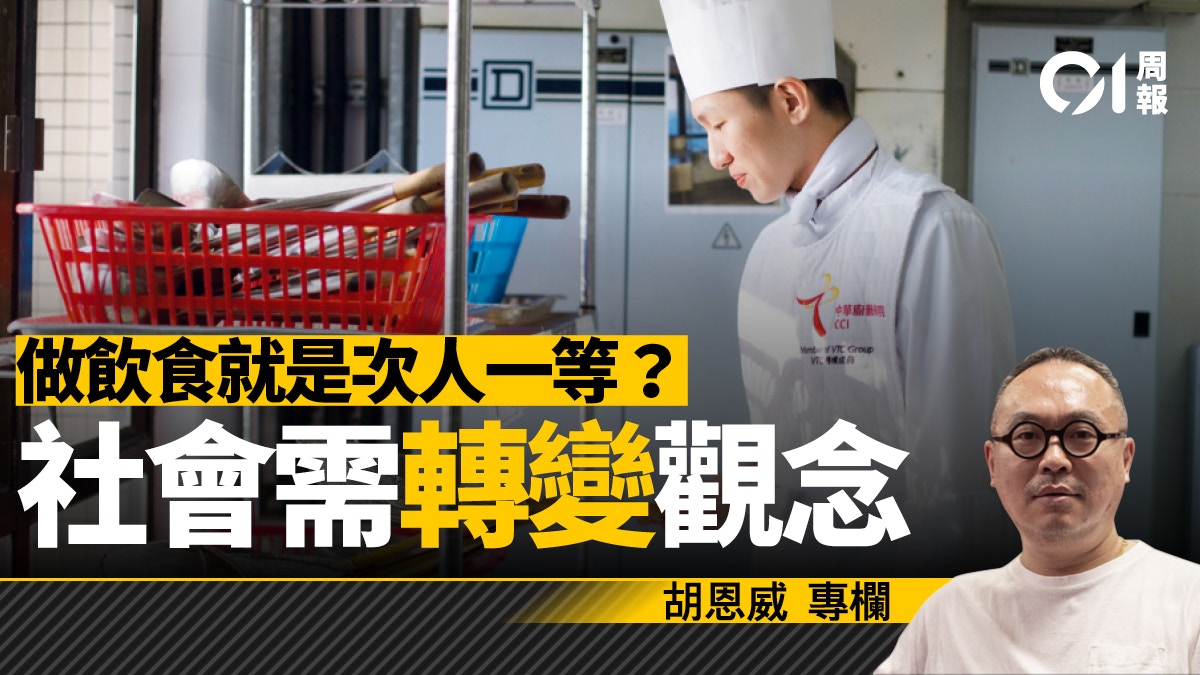The catering industry in Hong Kong has faced the problem of talent shortage in recent years. The Chinese catering industry will soon experience a situation where there are no successors and no successors, including many traditional Cantonese dishes, Chaozhou dishes and other types.
Times have changed, cooking Chinese food is very hard, and there is no pattern dominated by the form of cooking Western food and Japanese food. In recent years, the vocational training system of the Hong Kong government has also become a bureaucratic and institutionalized rigid situation.
In the past, talents in the catering industry in Hong Kong were passed down through the apprenticeship system and entered a system to learn from the master.
The purpose of vocational education promoted by the Hong Kong government is not to be a teacher-apprentice system, and students become just a service object.
The concept of respecting teachers and valuing Tao has basically disappeared in the entire education in Hong Kong. Students have become customers, and teachers have become waiters who provide services, not teachers.
This concept has basically spread to all learning modes in Hong Kong: students become customers, so they must meet the needs of customers, and customers' needs are often just to pass the test comfortably.
A hard-working industry like the catering industry has also become faced with great difficulties.
Good chefs are crucial to the development of the catering industry.
(Photo by Luo Junhao)
The catering industry needs several kinds of talents: the shopkeeper in front of the table, the waiter, the management behind the scenes, the cleaning, and of course the most important is the chef team.
A Chinese Culinary Institute has been established in Hong Kong to train chefs, but if you visit this Chinese Culinary Institute, you will find that its architectural shape has nothing to do with China at all, it is like a Western-style spaceship, and the courses inside are also Western-style. Teaching methods to teach Chinese food.
You can't say that the Chinese food taught is not Chinese, but it has always lost the flavor of Chinese food.
Thailand, South Korea, Japan and other places have always designed different types of courses according to their food culture, and have retained the mentoring system. Once you join a food and beverage enterprise group, you will have corresponding training methods.
There is also a Michelin three-star dessert school in France, which is divided into categories.
Hong Kong, by contrast, essentially treats vocational training as a training ground for exam failures.
Only after failing the exam do they go into the catering industry, because all successful people in Hong Kong are lawyers and doctors, and catering is second to none.
This strange class concept has also led young people to have abnormal thoughts, thinking that entering the Chinese catering industry is outdated.
So, how to activate?
How to do it?
Whether it is the current core catering groups in Hong Kong - Maxim's, Café de la Café, Big Happy, or high-end ones, they should study how to cultivate talents.
Vocational training in the Mainland attaches great importance to the mentoring system, so there are many vocational training courses taught by diet masters who have no PHD and no diploma.
The mentoring system must be inherited and Hong Kong must redo this aspect in order to be effective.
There is a saying in the mainland that "Eat in Guangdong, cook out of Fengcheng", "Fengcheng" is Shunde, which is famous for its delicious food. The local vocational training attaches great importance to catering talents.
Should Hong Kong also have a food and beverage platform research institute to study talent training policies around the world?
Is it possible to collect master chefs in Hong Kong and establish a relatively systematic oral history file of food and drink to introduce the history and culture of Hong Kong food to the public?
Hong Kong sorely lacks this view of history.
In terms of the supply of catering talents, it is relatively easy to solve such aspects as waiters. As for cooking skills such as Chinese cuisine, it takes a lot of hard work.
To develop superb cooking skills, you must work hard.
(Photo by Luo Junhao)
So, should the Chinese Culinary Institute rethink its mode of operation?
Shouldn't it be located in Pokfulam, but in a place closer to the ingredients such as Sai Kung?
Should private culinary academies be encouraged, the catering industry should be encouraged to run schools, and the government should provide support for development?
Japan has many such learning models of government-business cooperation, and Hong Kong should learn it, instead of filling out forms and using academic methods to deal with vocational education.
There are different types of culinary arts academies in the 18 districts of Hong Kong, which can encourage private operation, and the government provides support space, and can also cooperate with real estate developers to set up in shopping malls, some of which are cooking classes of interest groups, and some It is specialized.
In fact, Hong Kong's catering talents are the most comprehensive, and many gourmets will invest in catering, which is of great social and economic value.
As long as the government activates policies, plans more, and thinks more, to release the energy of Hong Kong's catering industry, it will inevitably create more possibilities.
[Benevolence and Power] Rebuilding and revitalizing Hong Kong's catering industry after the epidemic (1) [Environment and power] Revitalizing Hong Kong's catering industry (2): Updating the licensing system for market stalls and hawkers [Benevolence and power] Revitalizing Hong Kong's catering industry (3): Technology empowers fishing and agriculture
Hu Enwei
is a member of the National Hong Kong and Macao Research Association, a member of the Jiangsu Provincial Political Consultative Conference, and Zuni.
Icosahedron United Artistic Director and Chief Executive Officer

